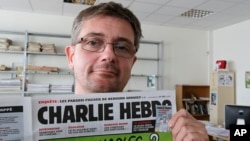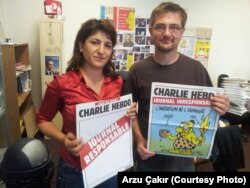The French satirical weekly newspaper Charlie Hebdo had just tweeted a cartoon mocking Islamic State group leader Abu Bakr al-Baghdadi when masked gunmen burst into its Paris office Wednesday.
Paris police said at least 12 people were killed, including two police officers, and at least 11 others were injured, with four listed in critical condition.
Ten members of the Charlie Hebdo staff died in the attack, prosecutors said. Among the dead were three cartoonists, including co-founder Jean “Cabu” Cabut and editor-in-chief Stephane “Charb” Charbonnier.
Charlie Hebdo, which publishes every Wednesday, is known for being irreverent, anti-establishment and virulently anti-religious.
Police said the weekly had received several threats in recent weeks and had permanent police protection.
Caricatures of Muslims
From publishing the Danish cartoons of the Prophet Muhammad that sparked Middle East riots in 2005 to renaming an edition Sharia Hebdo and listing Islam's prophet as its supposed editor-in-chief, the weekly has repeatedly caricatured Muslims and their beliefs.
It is renowned for courting controversy with satirical attacks on political and religious leaders.
Many of its cartoonists started in the 1960s on Hara-Kiri magazine, which openly proclaimed its aim to be “inane and nasty.” It was banned in 1970 after printing a mock death notice for General Charles de Gaulle, only to reappear months later under the name Charlie Hebdo.
But its attacks on Muslims have caused the most controversy, including a court case on charges of racism and the firebombing of its offices in 2011 after the Sharia Hebdo edition. “Hebdo” is French slang for a weekly newspaper.
The weekly has had permanent police protection since the firebombing incident.
The weekly has also made fun of the Muslim veil for women and ridiculed Islamist extremists. In the edition publishing the Danish cartoons, its cover had a drawing of the Prophet Muhammad in tears, saying: “It's hard to be loved by jerks.”
The racism case went to court in 2007, but the plaintiffs -- two leading French Muslim groups and the Saudi-backed Muslim World League -- stood no chance against the weekly's defense that France's freedom of speech and separation of church and state guaranteed its right to criticize any religion.
Free speech vs agitation
Because of its relentless criticism of many public figures and institutions, Charlie Hebdo's often crude -- many Muslims would also say cruel -- caricatures are seen in France more as free speech rather than far-right, anti-Muslim agitation.
In 2012, the publication again published Muhammad caricatures, depicting the prophet in naked and pornographic poses, which drew denunciations from around the Muslim world. These caricatures forced France to temporarily close embassies and schools in more than 20 countries amid fears of reprisals.
In a 2012 interview with VOA's Turkish service, editor Charbonnier had answered questions regarding the magazine’s take on an anti-Islamic movie called Innocence of Muslims.
He said the weekly had not defended the movie, which he characterized as vulgar. He instead said the magazine caricaturized the film itself.
Charbonnier, who said he is an atheist, said that he stays clear of mosques and churches because he always encounters shocking statements or discourse in those venues. In the same light, he stated that if believers do not want to be shocked, they should not read Charlie Hebdo.
Attacks on all religions
Reuters reported in 2012 that Charbonnier had been under police protection since the 2011 firebombing.
"This is a satirical paper produced by left-wingers and when I say left-wingers that goes all the way from anarchists to communists to Greens, Socialists and the rest. Above all it is a secular and atheist newspaper," Charbonnier told Reuters at the time.
"When we attack the Catholic hard right ... nobody talks about it in the papers. It's as if Charlie Hebdo has official authorization to attack the Catholic hard right. But we are not allowed to make fun of Muslim hardliners. It's the new rule ... but we will not obey it," he said in 2012.
In a 2011 interview with Germany's Der Spiegel, Charbonnier said, “If we worried about the consequences of each of our drawings in each of our 1,057 issues, then we would have had to close shop a long time ago.
“Extremists don’t need any excuses,” he said following the firebombing of his magazine offices, in which no one was hurt. "If they are not amused by our cartoons, they don't need to buy our magazine. Of course they are allowed to demonstrate. The right to protest needs to be protected, so long as one abides by the law and refrains from violence."
Minutes before the attack Wednesday, Charlie Hebdo had tweeted a satirical cartoon of the extremist Islamic State group's leader with a New Year's message that read: "Best wishes, by the way."
The extremist leader has previously urged his followers to attack citizens of the U.S., France and other countries involved in an international coalition, whose goal is to destroy the Islamic State group.
VOA's Turkish service contributed to this report. Some material for this report came from Reuters and AP.






